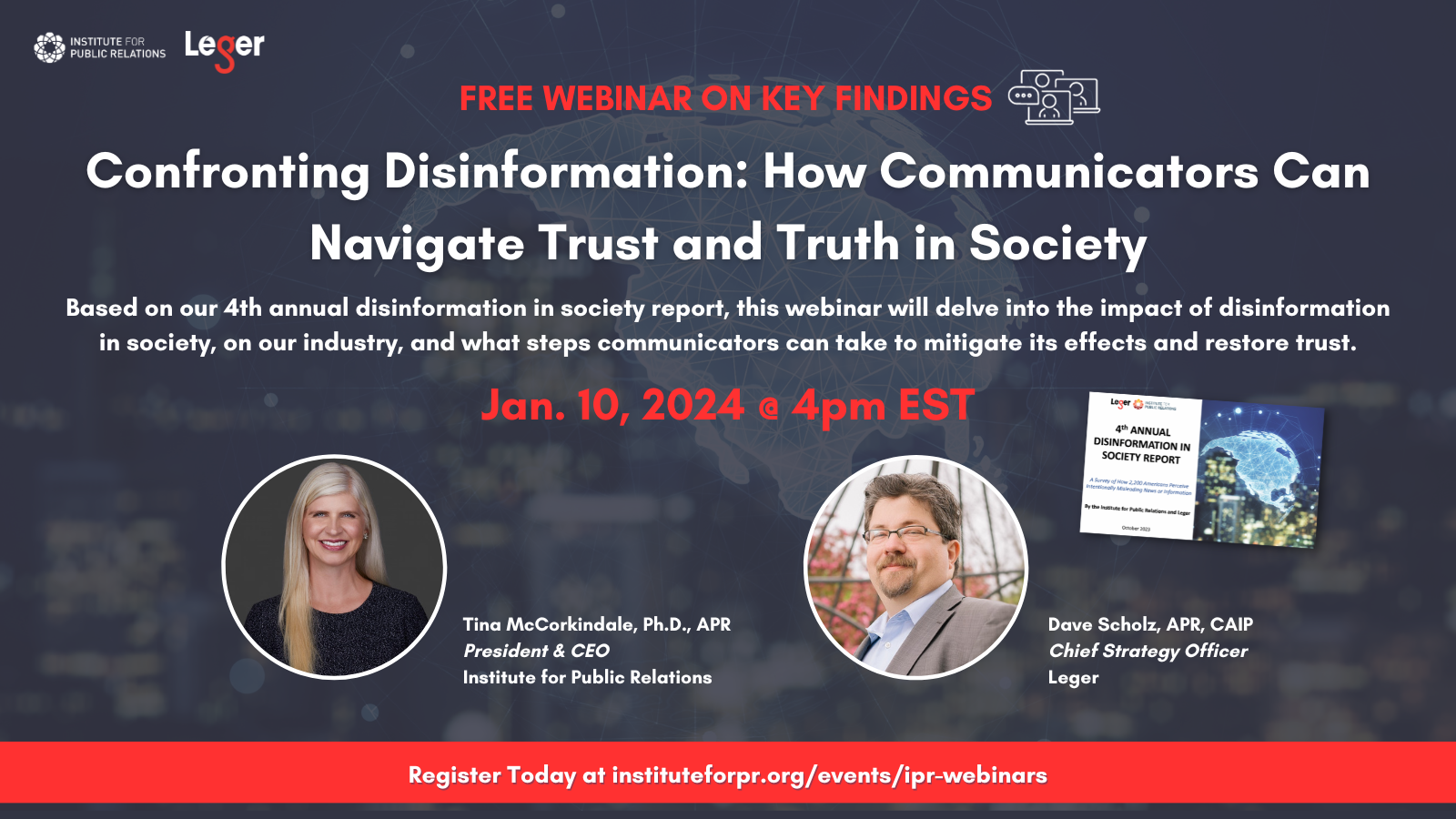U.S. adults have more access to news than ever before, whether they are reading it, hearing it, or even watching a TikTok video about it. As the way news is shared and the sheer volume of it increases, so does the potential for the spread of disinformation—information that is deliberately misleading or biased. Disinformation has heavily influenced U.S. discourse as people rapidly share the news they encounter (often without fact-checking), which has led to concerns about subjectivity and credibility. How is this impacting U.S. adults?
This year, we partnered with the Institute for Public Relations (IPR) to survey Americans about how they perceive their media intake, their trust in mainstream media, and the media’s effects on the electoral process. With the 2023 midterm elections having already taken place, and the 2024 Presidential election about a year away, misinformation and disinformation in the media are more important than ever, as people decide their country’s fate when they cast their ballots each November. From July 21 to August 3, 2023, we surveyed 2,002 U.S. adults to explore their perspectives on the presence of disinformation in the U.S., the sources they feel are most responsible for sharing disinformation, the level of trust they have in different information sources, and whose job they think it is to combat disinformation.
As noted by Dave Scholz, Chief Strategy Officer, Leger, and Tina McCorkindale, President and CEO, Institute for Public Relations, this year is a crucial one for combating disinformation.
“While this study finds much disagreement among Democrats and Republicans, one of the few areas they agree upon is the impact of disinformation. Our study reveals that as of 2023, a majority still views misinformation and disinformation as significant challenges, echoing the sentiments from the last survey in 2021. More alarmingly, such perceptions have seeped deep into the American psyche, casting shadows on the electoral process and eroding the foundational trust in democratic institutions. Concurrently, as confidence in social media platforms dwindles, Americans are turning toward their inner circles—family, friends, and like-minded individuals—as the most credible sources of information, indicating a potential pivot toward more insular information ecosystems. Unfortunately, though, one of the challenges is people believe themselves, people like them, and family are the most adept at discerning and combatting information.
The takeaway for this 2023 study is that Americans need to come together and take the fight against disinformation seriously. We need to understand our roles in sharing disinformation and that we all must actively combat it to ensure we have a strong and fair society, especially with 2024 as a pivotal election year.”
SOME OF THE KEY FINDINGS OF OUR DISINFORMATION STUDY, CONDUCTED IN PARTNERSHIP WITH IPR, INCLUDE…
-
Compared to 2021, most Americans still consider misinformation* (61% vs. 69% in 2021) and disinformation** (60% vs. 69% in 2021) to be major problems, more so than border security (57%), the budget deficit (56%), climate change (55%), domestic terrorism (44%), and international (43%) terrorism.
-
Americans continue to view family, friends, and like-minded people as the most trustworthy sources for accurate news or information and the least likely to spread disinformation. 3-in-4 respondents (75%) said they had at least “some” trust in their family as a source for accurate news and information, closely followed by ‘people like me’ (72%) and friends (69%). Trust across all social media platforms declined from 2021 to 2023.
- Social media, politicians of the opposing party and political activist groups, along with the Chinese and Russian governments are the top offenders believed to be responsible for spreading disinformation to the public. Facebook (73%), Tik Tok (65%), and X (62%) are the top three social media platforms seen as being at least “somewhat” responsible for spreading disinformation. In terms of the presidency, 58% of Republicans (-8 pp) consider President Joe Biden to be “very responsible” for spreading disinformation, compared to 70% of Democrats (+2 pp) who say former President Donald Trump is “very responsible” for spreading disinformation.
*Misinformation was defined as “false information that is spread, regardless of whether there is an intent to mislead.”
**Disinformation was defined as “deliberately misleading or biased information.”
The full report also features insights on U.S. adults’ perspectives on:
- Their top concerns for the country
- How disinformation impacts society
- Combatting the spread of disinformation
- The presence of disinformation
REGISTER FOR IPR’S UPCOMING DISINFORMATION WEBINAR
On January 10th, 2024, join Dave Scholz, Chief Strategy Officer, Leger, as well as Tina McCorkindale, President and CEO of the Institute for Public Relations, as they discuss the findings of this study in detail during a webinar organized by IPR. To register, click here.

